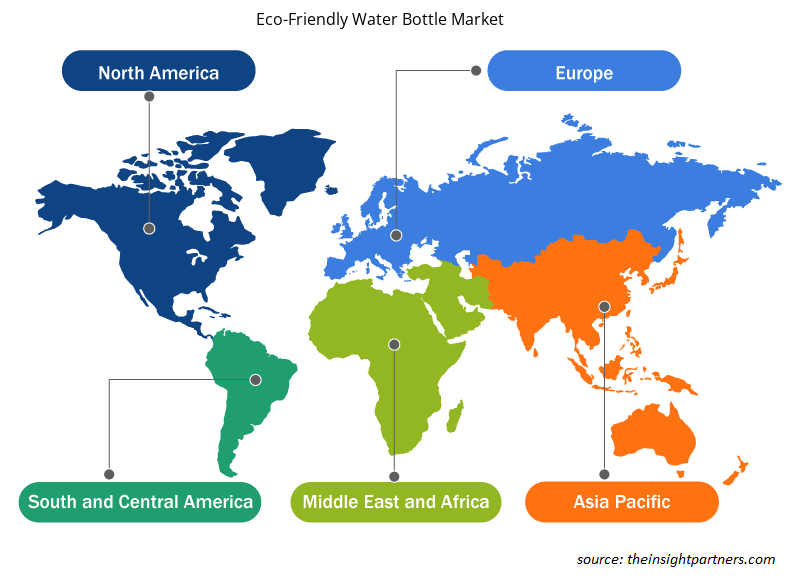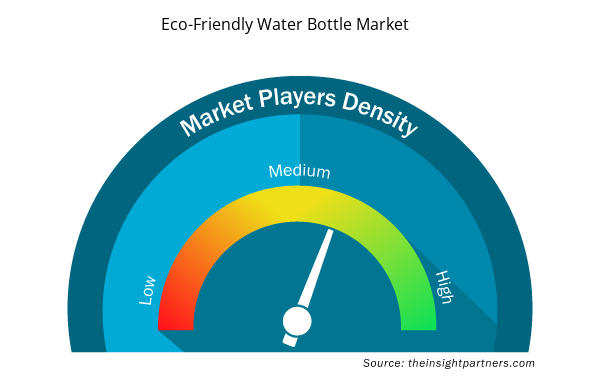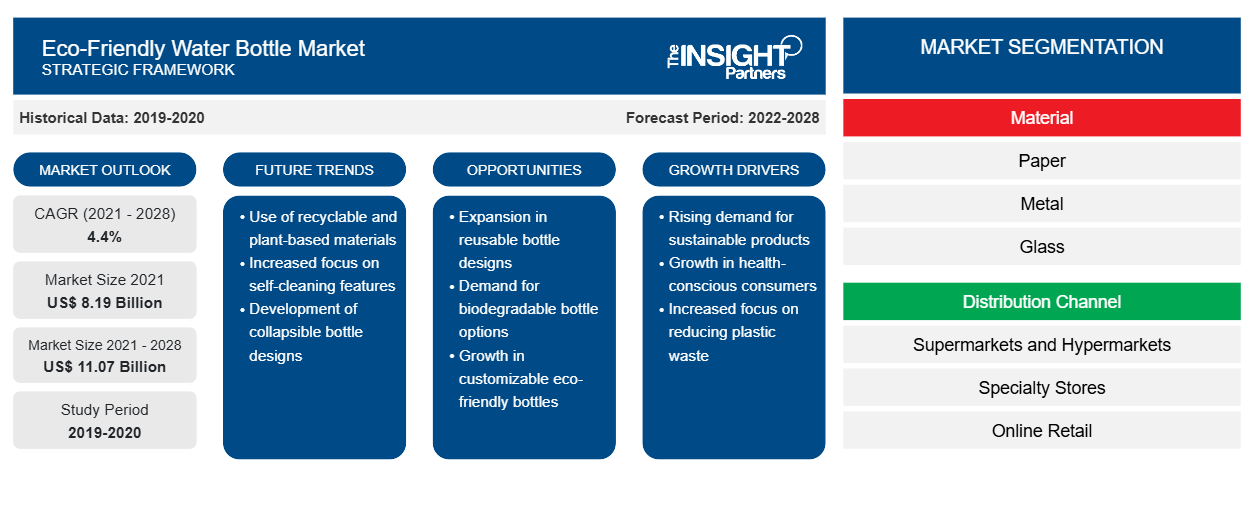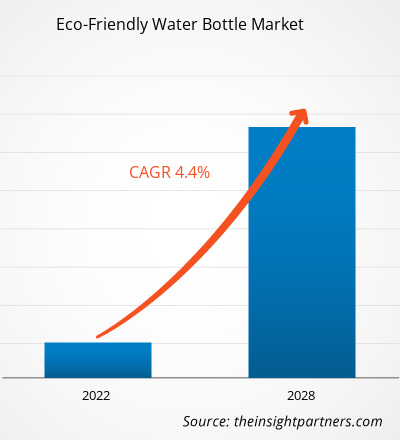Se proyecta que el tamaño del mercado de botellas de agua ecológicas alcance los US$ 11.068,71 millones para 2028 desde los US$ 8.193,19 millones en 2021; se espera que crezca a una CAGR del 4,4% durante 2021-2028.
El crecimiento del mercado se atribuye a la creciente conciencia ambiental entre los consumidores. Los consumidores están reemplazando de forma proactiva las botellas de agua de plástico de un solo uso por botellas de agua ecológicas para evitar la acumulación de plástico en el medio ambiente. La tendencia se ve favorecida por los canales de las redes sociales, donde los influencers están promoviendo el uso de botellas de agua reutilizables como una opción ética.
En 2020, Asia Pacífico tuvo la mayor participación del mercado de botellas de agua ecológicas y se estima que registrará la CAGR más alta durante el período de pronóstico. El mercado de Asia Pacífico está segmentado en China, India, Japón, Corea del Sur y Australia. Países como Corea del Sur, China y Japón se encuentran entre los principales contribuyentes al mercado en esta región debido a la creciente población y la consiguiente demanda de bienes de consumo. Además, la rápida urbanización, el notable desarrollo económico, la diversidad cultural y la creciente adopción de tendencias de alta tecnología son los factores que favorecen el crecimiento del mercado de botellas de agua ecológicas de Asia Pacífico.
Personalice este informe según sus necesidades
Obtendrá personalización en cualquier informe, sin cargo, incluidas partes de este informe o análisis a nivel de país, paquete de datos de Excel, así como también grandes ofertas y descuentos para empresas emergentes y universidades.
- Obtenga las principales tendencias clave del mercado de este informe.Esta muestra GRATUITA incluirá análisis de datos, desde tendencias del mercado hasta estimaciones y pronósticos.
Impacto de la pandemia de COVID-19 en el mercado de botellas de agua ecológicas
La pandemia de COVID-19 ha afectado significativamente al sector manufacturero en términos de eficiencia operativa debido a los cierres prolongados en diferentes regiones; el cierre de unidades de fabricación; las restricciones a los viajes, el comercio internacional y las cadenas de suministro; y la escasez de materias primas. Estos factores también han obstaculizado el crecimiento del mercado debido al aumento de los precios de las materias primas, la escasez de mano de obra y la inestabilidad en el frente financiero. Sin embargo, las empresas están ganando terreno a medida que se suavizan las limitaciones impuestas anteriormente en varios países, con la introducción y administración de las vacunas COVID-19. Además, los gobiernos de diferentes países están planeando desarrollar infraestructura moderna y tecnológicamente avanzada para mitigar los impactos económicos de la pandemia. Además, durante las últimas fases de la pandemia, los consumidores participaron en actividades recreativas al aire libre, lo que ayudó a la demanda de botellas de agua ecológicas.lockdowns across different regions; manufacturing units shutdown; restrictions on travel, international trades, and supply chains; and shortage of raw materials. These factors have also hindered the growth of the market owing to rising prices of raw materials, shortage of workforce, and instability on the financial front. However, businesses are gaining ground as previously imposed limitations are being eased across various countries, with the introduction and administration of COVID-19 vaccines. Furthermore, governments of different countries are planning to develop modern and technologically advanced infrastructure to mitigate the economic impacts of the pandemic. Moreover, during the late pandemic phases, consumers participated in outdoor recreational activities, which aided the demand for eco-friendly water bottles.
Los
avances tecnológicos impulsan el crecimiento del mercado de botellas de agua ecológicas
Las botellas de agua ecológicas están hechas de vidrio, plásticos de origen vegetal, papel y otras materias primas sostenibles. Los fabricantes se centran en la adopción de plásticos de origen biológico, metales reciclables y vidrio para fabricar botellas de agua ecológicas. Los plásticos de origen biológico se fabrican a partir de materiales renovables, como la soja y el maíz, en lugar de combustibles fósiles. Estos productos reducen la dependencia de los combustibles fósiles mediante el uso de recursos renovables. Las botellas de agua ecológicas se utilizan cada vez más en diversos espacios comerciales, como talleres, casas de piscina, hoteles, gimnasios y otras instalaciones deportivas, spas y salones de belleza, y hospitales e instalaciones médicas.eco-friendly water bottles. Bio-based plastics are made from renewable materials, such as soy and corn, rather than fossil fuels. These products reduce reliance on fossil fuels by using renewable resources. Eco-friendly water bottles are increasingly used in various commercial spaces, such as workshops, pool houses, hotels, gyms and other sports facilities, spas and beauty salons, and hospitals and medical facilities.
Según los datos de la Asociación Internacional de Agua Embotellada (IBWA) publicados en 2020, los estadounidenses consumieron 15 mil millones de galones de agua embotellada en 2020. Esto indica el potencial de mercado para que los proveedores de botellas de agua ecológicas amplíen su alcance. Alienta a los fabricantes a adoptar nuevas tecnologías para producir soluciones ecológicas.IBWA) data published in 2020, Americans consumed 15 billion gallons of bottled water in 2020. This signifies the market potential for eco-friendly water bottle providers for expanding their reach. It encourages manufacturers to adopt new technologies for producing eco-friendly solutions.
Información sobre el canal de distribución
Según el canal de distribución, el mercado mundial de botellas de agua ecológicas se segmenta en supermercados e hipermercados, tiendas especializadas, venta minorista en línea y otros. En 2020, el segmento de supermercados e hipermercados representó la mayor participación en los ingresos, y se espera que el segmento de venta minorista en línea registre la CAGR más alta durante el período de pronóstico. Los supermercados e hipermercados son fácilmente accesibles en todas las regiones y están muy extendidos en términos de ubicaciones. Adoptan técnicas de comercialización atractivas que atraen a los consumidores, generando así mayores ventas de botellas de agua ecológicas.
Chilly's; S'well; Ocean Bottle; Corkcicle; Hydro Flask; Bottles Società Benefit SrlPIVA; Frank Green; Qwetch; Klean Kanteen; y Kinto Co., Ltd. se encuentran entre los actores que operan en el mercado de botellas de agua ecológicas. Estas empresas ofrecen una amplia gama de carteras de productos para el mercado. Muchas empresas de este mercado tienen presencia en regiones en desarrollo, lo que les brinda oportunidades lucrativas. Los actores del mercado están desarrollando productos innovadores y de alta calidad para satisfacer los requisitos de los clientes.; S'well; Ocean Bottle; Corkcicle; Hydro Flask; Bottles Società Benefit S.r.l. P.IVA; Frank Green; Qwetch; Klean Kanteen; and Kinto Co., Ltd. are among the players operating in the eco-friendly water bottle market. These companies provide a wide range of product portfolio for the market. Many companies in this market have presence in developing regions, which provides lucrative opportunities to them. The market players are developing high-quality and innovative products to meet the customer’s requirements.
Perspectivas regionales del mercado de botellas de agua ecológicas
Los analistas de Insight Partners explicaron en detalle las tendencias y los factores regionales que influyen en el mercado de botellas de agua ecológicas durante el período de pronóstico. Esta sección también analiza los segmentos y la geografía del mercado de botellas de agua ecológicas en América del Norte, Europa, Asia Pacífico, Oriente Medio y África, y América del Sur y Central.

- Obtenga datos regionales específicos para el mercado de botellas de agua ecológicas
Alcance del informe de mercado de botellas de agua ecológicas
| Atributo del informe | Detalles |
|---|---|
| Tamaño del mercado en 2021 | US$ 8,19 mil millones |
| Tamaño del mercado en 2028 | US$ 11.07 mil millones |
| CAGR global (2021-2028) | 4,4% |
| Datos históricos | 2019-2020 |
| Período de pronóstico | 2022-2028 |
| Segmentos cubiertos | Por material
|
| Regiones y países cubiertos | América del norte
|
| Líderes del mercado y perfiles de empresas clave |
|
Densidad de actores del mercado de botellas de agua ecológicas: comprensión de su impacto en la dinámica empresarial
El mercado de botellas de agua ecológicas está creciendo rápidamente, impulsado por la creciente demanda de los usuarios finales debido a factores como la evolución de las preferencias de los consumidores, los avances tecnológicos y una mayor conciencia de los beneficios del producto. A medida que aumenta la demanda, las empresas amplían sus ofertas, innovan para satisfacer las necesidades de los consumidores y aprovechan las tendencias emergentes, lo que impulsa aún más el crecimiento del mercado.
La densidad de actores del mercado se refiere a la distribución de las empresas o firmas que operan dentro de un mercado o industria en particular. Indica cuántos competidores (actores del mercado) están presentes en un espacio de mercado determinado en relación con su tamaño o valor total de mercado.
Las principales empresas que operan en el mercado de botellas de agua ecológicas son:
- Frío
Descargo de responsabilidad : Las empresas enumeradas anteriormente no están clasificadas en ningún orden particular.

- Obtenga una descripción general de los principales actores clave del mercado de botellas de agua ecológicas
Informe Destacado
- Tendencias progresivas de la industria en el mercado para ayudar a los actores a desarrollar estrategias efectivas a largo plazo
- Estrategias de crecimiento empresarial adoptadas por los mercados desarrollados y en desarrollo
- Análisis cuantitativo del mercado de 2019 a 2028
- Estimación de la demanda mundial de botellas de agua ecológicas
- Análisis PEST para ilustrar la eficacia de los compradores y proveedores que operan en la industria de bienes de consumo
- Avances recientes para comprender el escenario competitivo del mercado
- Tendencias y perspectivas del mercado, así como factores que impulsan y restringen el crecimiento del mercado de botellas de agua ecológicas
- Asistencia en el proceso de toma de decisiones destacando las estrategias de mercado que sustentan el interés comercial y conducen al crecimiento del mercado.
- El tamaño del mercado de botellas de agua ecológicas en varios nodos
- Descripción detallada y segmentación del mercado, así como la dinámica de la industria de botellas de agua ecológicas
- Tamaño del mercado de botellas de agua ecológicas en varias regiones con prometedoras oportunidades de crecimiento
El "Análisis del mercado mundial de botellas de agua ecológicas hasta 2028" es un estudio especializado y profundo de la industria de productos químicos y materiales con un enfoque especial en el análisis de tendencias del mercado mundial de botellas de agua ecológicas. El informe tiene como objetivo proporcionar una descripción general del mercado con una segmentación detallada del mercado. El mercado de botellas de agua ecológicas está segmentado en función del material, el canal de distribución y la geografía. Por material, el mercado está segmentado en papel, metal, vidrio y otros. Por canal de distribución, el mercado está segmentado en supermercados e hipermercados, tiendas especializadas, venta minorista en línea y otros. Por geografía, el mercado de botellas de agua ecológicas está ampliamente segmentado en América del Norte, Europa, Asia Pacífico (APAC), Medio Oriente y África (MEA) y América del Sur y Central (SAM).
Perfiles de empresas
- Chilly's
- Hinchar
- Botella de océano
- Corkciclismo
- Botella Hydro Flask
- Botellas Società Benefit SrlPIVA
- Verde franco
- Qwetch
- Lavandería Klean Kanteen
- Compañía Kinto, Ltd.
- Análisis histórico (2 años), año base, pronóstico (7 años) con CAGR
- Análisis PEST y FODA
- Tamaño del mercado Valor/volumen: global, regional, nacional
- Industria y panorama competitivo
- Conjunto de datos de Excel


- Medical Devices Market
- Water Pipeline Leak Detection System Market
- Personality Assessment Solution Market
- Volumetric Video Market
- Virtual Event Software Market
- Biopharmaceutical Tubing Market
- Sandwich Panel Market
- Fertilizer Additives Market
- Real-Time Location Systems Market
- Batter and Breader Premixes Market

Report Coverage
Revenue forecast, Company Analysis, Industry landscape, Growth factors, and Trends

Segment Covered
This text is related
to segments covered.

Regional Scope
North America, Europe, Asia Pacific, Middle East & Africa, South & Central America

Country Scope
This text is related
to country scope.
Preguntas frecuentes
The global eco-friendly bottle market is expanding rapidly due to increased public and government awareness about environmental protection. The crucial driver propelling the market is the increased availability of a diverse selection of items from various brands on e-commerce platforms with services such as free delivery and promotional discounts.
Based on material, the metal segment is expected to be the fastest-growing segment during the forecast period. The characteristics of metal water bottles, such as durability and reusability, are expected to propel the eco-friendly water bottle market growth.
In 2020, the supermarkets and hypermarkets segment held the largest market share. The availability of a wide variety of products under one roof attract customers to shop at these stores. Furthermore, consumer-oriented product placement that aids them in selecting and purchasing the product faster than waiting for its delivery, as is the case with online purchases.
In 2020, the metal segment held the largest market share. Metal acts as a better shielding barrier than any plastic material. Metal is abundant in nature and can be recycled again with minimal energy waste during manufacture, lowering the overall cost of production for eco-friendly water bottles. These factors contribute to the growth of the eco-friendly water bottle market.
The major players operating in the eco-friendly water bottles market are Chilly's, S'well, Ocean Bottle, Corkcicle, Hydro Flask, 24 Bottles Società Benefit S.r.l. P.IVA, Frank Green, Qwetch, Klean Kanteen, and Kinto Co., Ltd.
In 2020, Asia-Pacific accounted for the largest share of the global eco-friendly water bottles market. The eco-friendly water bottle market has expanded significantly as governments and consumers have become more concerned about environmental issues. Manufacturers' increasing investments on research and development are crucial factors impacting the eco-friendly water bottle market positively.
Trends and growth analysis reports related to Consumer Goods : READ MORE..
The List of Companies - Eco-Friendly Water Bottle Market
- Chilly’s
- S'well
- Ocean Bottle
- Corkcicle
- Hydro Flask
- 24 Bottles Società Benefit S.r.l. P.IVA
- Frank Green
- Qwetch
- Klean Kanteen
- Kinto Co., Ltd.
The Insight Partners performs research in 4 major stages: Data Collection & Secondary Research, Primary Research, Data Analysis and Data Triangulation & Final Review.
- Data Collection and Secondary Research:
As a market research and consulting firm operating from a decade, we have published and advised several client across the globe. First step for any study will start with an assessment of currently available data and insights from existing reports. Further, historical and current market information is collected from Investor Presentations, Annual Reports, SEC Filings, etc., and other information related to company’s performance and market positioning are gathered from Paid Databases (Factiva, Hoovers, and Reuters) and various other publications available in public domain.
Several associations trade associates, technical forums, institutes, societies and organization are accessed to gain technical as well as market related insights through their publications such as research papers, blogs and press releases related to the studies are referred to get cues about the market. Further, white papers, journals, magazines, and other news articles published in last 3 years are scrutinized and analyzed to understand the current market trends.
- Primary Research:
The primarily interview analysis comprise of data obtained from industry participants interview and answers to survey questions gathered by in-house primary team.
For primary research, interviews are conducted with industry experts/CEOs/Marketing Managers/VPs/Subject Matter Experts from both demand and supply side to get a 360-degree view of the market. The primary team conducts several interviews based on the complexity of the markets to understand the various market trends and dynamics which makes research more credible and precise.
A typical research interview fulfils the following functions:
- Provides first-hand information on the market size, market trends, growth trends, competitive landscape, and outlook
- Validates and strengthens in-house secondary research findings
- Develops the analysis team’s expertise and market understanding
Primary research involves email interactions and telephone interviews for each market, category, segment, and sub-segment across geographies. The participants who typically take part in such a process include, but are not limited to:
- Industry participants: VPs, business development managers, market intelligence managers and national sales managers
- Outside experts: Valuation experts, research analysts and key opinion leaders specializing in the electronics and semiconductor industry.
Below is the breakup of our primary respondents by company, designation, and region:

Once we receive the confirmation from primary research sources or primary respondents, we finalize the base year market estimation and forecast the data as per the macroeconomic and microeconomic factors assessed during data collection.
- Data Analysis:
Once data is validated through both secondary as well as primary respondents, we finalize the market estimations by hypothesis formulation and factor analysis at regional and country level.
- Macro-Economic Factor Analysis:
We analyse macroeconomic indicators such the gross domestic product (GDP), increase in the demand for goods and services across industries, technological advancement, regional economic growth, governmental policies, the influence of COVID-19, PEST analysis, and other aspects. This analysis aids in setting benchmarks for various nations/regions and approximating market splits. Additionally, the general trend of the aforementioned components aid in determining the market's development possibilities.
- Country Level Data:
Various factors that are especially aligned to the country are taken into account to determine the market size for a certain area and country, including the presence of vendors, such as headquarters and offices, the country's GDP, demand patterns, and industry growth. To comprehend the market dynamics for the nation, a number of growth variables, inhibitors, application areas, and current market trends are researched. The aforementioned elements aid in determining the country's overall market's growth potential.
- Company Profile:
The “Table of Contents” is formulated by listing and analyzing more than 25 - 30 companies operating in the market ecosystem across geographies. However, we profile only 10 companies as a standard practice in our syndicate reports. These 10 companies comprise leading, emerging, and regional players. Nonetheless, our analysis is not restricted to the 10 listed companies, we also analyze other companies present in the market to develop a holistic view and understand the prevailing trends. The “Company Profiles” section in the report covers key facts, business description, products & services, financial information, SWOT analysis, and key developments. The financial information presented is extracted from the annual reports and official documents of the publicly listed companies. Upon collecting the information for the sections of respective companies, we verify them via various primary sources and then compile the data in respective company profiles. The company level information helps us in deriving the base number as well as in forecasting the market size.
- Developing Base Number:
Aggregation of sales statistics (2020-2022) and macro-economic factor, and other secondary and primary research insights are utilized to arrive at base number and related market shares for 2022. The data gaps are identified in this step and relevant market data is analyzed, collected from paid primary interviews or databases. On finalizing the base year market size, forecasts are developed on the basis of macro-economic, industry and market growth factors and company level analysis.
- Data Triangulation and Final Review:
The market findings and base year market size calculations are validated from supply as well as demand side. Demand side validations are based on macro-economic factor analysis and benchmarks for respective regions and countries. In case of supply side validations, revenues of major companies are estimated (in case not available) based on industry benchmark, approximate number of employees, product portfolio, and primary interviews revenues are gathered. Further revenue from target product/service segment is assessed to avoid overshooting of market statistics. In case of heavy deviations between supply and demand side values, all thes steps are repeated to achieve synchronization.
We follow an iterative model, wherein we share our research findings with Subject Matter Experts (SME’s) and Key Opinion Leaders (KOLs) until consensus view of the market is not formulated – this model negates any drastic deviation in the opinions of experts. Only validated and universally acceptable research findings are quoted in our reports.
We have important check points that we use to validate our research findings – which we call – data triangulation, where we validate the information, we generate from secondary sources with primary interviews and then we re-validate with our internal data bases and Subject matter experts. This comprehensive model enables us to deliver high quality, reliable data in shortest possible time.


 Obtenga una muestra gratuita de este informe
Obtenga una muestra gratuita de este informe